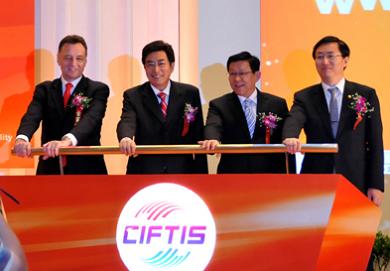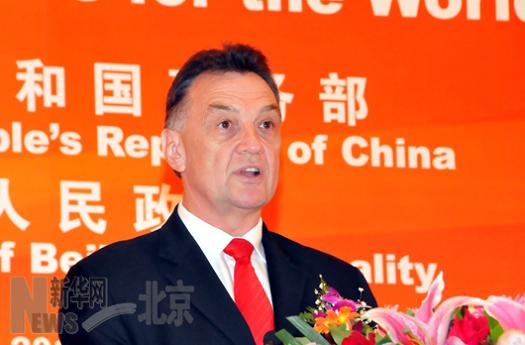Address to the Third China Trade in Services Congress
China World Trade Center, Beijing
Speech, check against delivery
1 June 2011
As Australia’s newly-appointed Trade Minister I was delighted to be able to visit China last November. I am pleased to say this is my third visit as Minister. During my second, in April, Minister for Commerce Chen Deming invited me to address the Third China Trade in Services Congress in Beijing. China attaches great importance to this Congress and so does Australia, so I happily accepted.
During my April visit, a week ahead of Australian Prime Minister Julia Gillard’s visit to China, we agreed on a Memorandum of Understanding to establish the Chinese Services Sector Promotion Forum. Prime Minister Gillard and Premier Wen Jiabao witnessed the Memorandum’s signing.
The Memorandum of Understanding sets up a forum of chief executive officers to boost cooperation in the trade in services. The signing of this Memorandum of Understanding is an acknowledgment by both our countries of the enormous upside potential of two-way service industry trade and investment.


(Photos are from Xinhua News Agency)
In 2010 China became Australia’s biggest services export market. Valued at $6 billion and dominated by education and tourism, the trade in services has averaged annual growth of 15 per cent over the past five years.
Chinese tourist visits to Australia are set to boom. Last year there were 470,000 arrivals from China in Australia. China is Australia’s fastest growing inbound tourism market and is forecast to grow at more than 8.5 per cent per annum over the next decade, resulting in around 900,000 Chinese visitors a year by 2020.
China is Australia’s largest source of overseas students. In 2010 there were 167,000 enrolments by Chinese students in Australia. Twelve years ago, that number was just 9,000 students.
As China’s economy matures and develops, it is natural that it develops its services economy. This is a key goal of the 12th Five-Year Plan, and it is also a theme that Minister Chen took up at the Boao Forum in April.
Here in Beijing, Mayor Guo told me last night that services constituted 75 per cent of the city’s economy and the plan is to increase that share to 78 per cent within the next five years. The Mayor advised me that the desire is to make Beijing humanistic, green and technologically advanced.
The broadening of the Australia-China relationship into services builds on the achievements of the visionary leadership of our two countries going back as far as 1972, when Gough Whitlam, as the Australian Opposition Leader, visited China, and formally recognised the People’s Republic within days of becoming Prime Minister.
Though the friendship and commercial relationship between our two countries developed gradually during the 1970s, it was not until the mid-1980s that it began its stellar climb. Prime Minister Bob Hawke visited China frequently, spending hours in deep conversation with the Chinese leadership, together imagining and planning a great partnership as China began its market-opening transformation.
It was on one of those visits, in May 1986, accompanied by my PhD Supervisor, Dr Ross Garnaut, when Bob Hawke rang me back in Australia and offered me the position of economic and trade adviser on his personal staff. Dr Garnaut would soon become Australia’s Ambassador to China.
In Australia we worked on establishing trade and investment in minerals and energy, announcing during the 1987 federal election campaign China’s decision to invest in the Mt Channar iron ore deposit in Western Australia. It was China’s first overseas mining investment.
Since 1990 Australian exports to China have increased 40-fold.
Australia continues to encourage Chinese direct foreign investment. In the last four years Chinese companies have lodged 180 applications to invest in Australia. All have been approved, six with conditions.
But we are here today to discuss service industry cooperation. Government typically has a high level of involvement in the services sector through domestic regulations such as licensing and qualification requirements, standards, and rules on foreign investment. If these are not handled carefully, domestic regulations can inhibit trade in services.
But domestic regulation – done properly – can underpin a well-functioning and competitive services sector.
Australia’s own economic history testifies to the importance of getting services sector regulation right. For a federal system like ours, with responsibilities split between national and state governments, cooperation between different levels of government has been essential to improving our domestic regulation.
This cooperation was most recently boosted by an agreement reached in 2008 between all Australian governments called a National Partnership Agreement to Deliver a Seamless National Economy.
This agenda for a seamless national economy aims to create in Australia a single national market, reducing costs incurred by business in complying with unnecessary and inconsistent regulation across jurisdictions, and improving productivity in the process.
Australia is therefore well placed to contribute the lessons we have learned through these important structural reform efforts, given our history of undertaking difficult but necessary structural reforms since the 1980s. I want to engage with our Chinese counterparts in sharing that experience, both bilaterally, in the Services Sector Promotion Forum we have now established and in wider dialogue, such as the APEC dialogue on structural reform.
In pursuit of a deeper and broader commercial relationship between our two countries, the Gillard Government has resolved to upgrade Australia’s presence in an engagement with China. And while Beijing, as the seat of National Government, will remain the focal point of that engagement, we will be building relationships in China’s provinces.
Foreign Minister Kevin Rudd set this strategy out compellingly last week during his visit to China.
On Monday, I launched AustCham’s Financial Services Issues Paper in Shanghai, copies of which we are making available to Congress delegates. Today I am travelling by fast train to Tianjin, a city of 13 million people. Tomorrow I am heading for Shenyang, with a population of seven million.
In August, Mr Rudd and I, as Australia’s Ministers of Foreign Affairs and Trade, will lead an Australian business delegation to China’s fast-growing and populous ‘second cities’. Just five of these smaller cities have a combined population greater than Australia’s.
Indeed, China already has 93 cities each with a population greater than Sydney’s. And by 2025, when Australia’s population nudges 28 million, more than one billion people will live in China’s cities.
These cities will need banking, insurance, financial and legal services. They will need architectural and design services. They will need water and clean energy. They will need transport infrastructure and logistical support. And they will need air quality monitoring and management.
In the banking sector, all of Australia’s so-called Big Four banks have invested in China. These Australian banks are four of just nine banks in the world with AA ratings or better.
It’s no accident that Australia is a financial hub for the Asia-Pacific and home to the world’s fourth-largest pool of funds under management. Our compulsory superannuation savings system has ensured that.
In architecture and construction, Australian firms contributed strongly to Beijing’s Olympic glory through their involvement in the design of the 2008 Olympic village, the Watercube Swimming Centre and the 2008 Tsingdao Olympic Sailing Facility.
Australian firms have substantial engagement in design and construction in other cities throughout China, including in sustainable and eco-friendly design.
Last month the Gillard Government completed the first review of the Australian Trade Commission — Austrade — in two decades. The review concluded that Austrade’s presence should be upgraded in emerging markets such as China, with an emphasis on provincial cities.
Shenyang is an early candidate for an Austrade office. Tomorrow I might take the opportunity to visit a few real estate agents there on behalf of the Australian Government.
But seriously, our interest in Shenyang is just one indication of Australia’s commitment to broadening and strengthening our friendship, trade and investment relationships with China. We are here for the long haul, to the benefit of the people of our two great nations.
Media inquiries
- Minister Emerson's Office: (02) 6277 7420
- DFAT Media Liaison: (02) 6261 1555
